medicinal mushroom blend
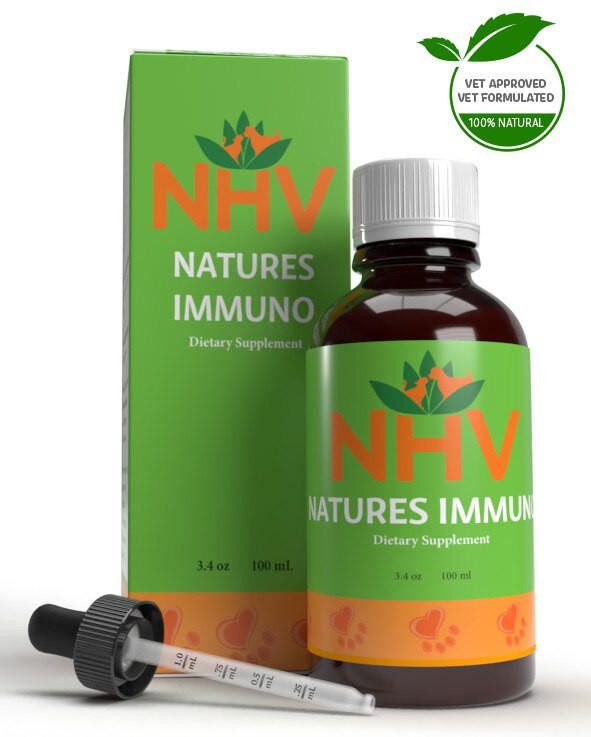
free shipping over $100 (USA & Canada)
1-877-937-4372 the pet expert hotline
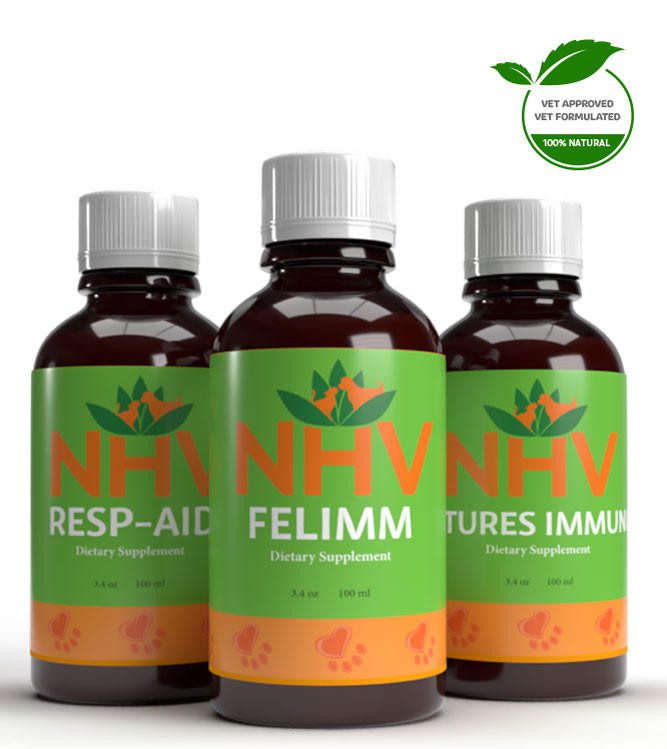
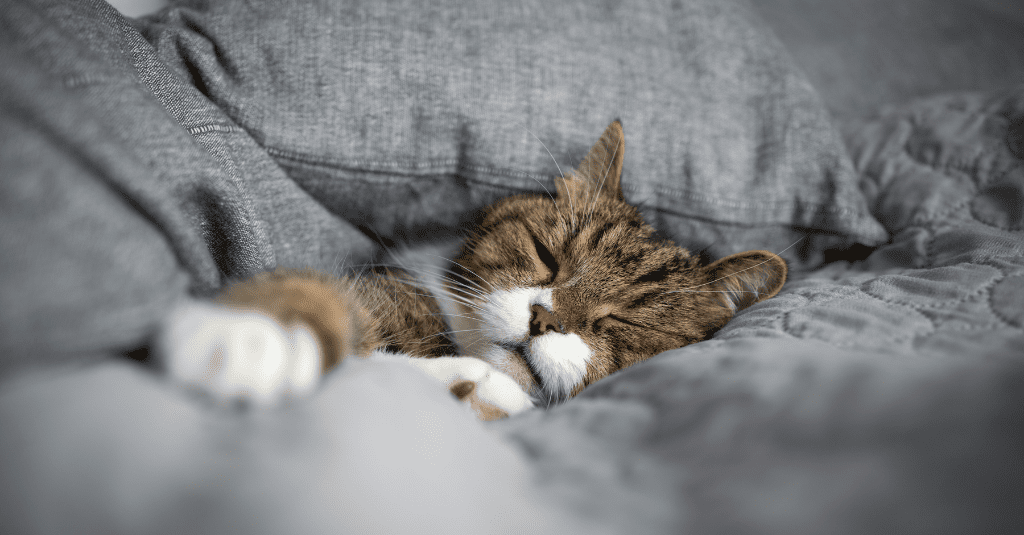
As humans, we know too well that when the temperatures start to drop, flu season is just around the corner. As pet parents, we might be worried that the same can happen to our little ones. Even though there is a chance of higher infection of kennel cough in dogs or cat flu near the holidays, you should have your eyes out for respiratory viruses affecting your pet all year round.
The truth of the matter is that your furkiddo can catch a respiratory virus anywhere and at any time. But there is usually a higher number of pets spending time with other animals in kennel or cattery boarding during the holidays when fur parents are out visiting the family. And that is why we can see an increase in the infection rate of diseases like kennel cough or cat flu near the holiday season.
We can see an increase in the infection rate of diseases like kennel cough or cat flu near the holiday season.
So if you think your little one might be sick, please separate them from other pets and visit a veterinarian. Typical signs of cat flu and kennel cough, like sneezing, can be present in many conditions, such as asthma, allergies and even nasal tumors. A thorough examination by a specialist will give you a confirmed diagnosis, so you can know whether or not to quarantine your pet from other furkiddos.
Vaccination ahead of the season may help protect your little one against viral infections. Boosting your little one’s immune system and keeping their blood panels up to date is also a great proactive measure. Lastly avoiding overcrowded places and contact with sick animals are great ways to prevent your cat from catching a cold or flu or your pup from getting kennel cough.
Feline rhinotracheitis, or cat flu, is an upper respiratory infection that affects domestic cats and demands special attention. That’s because once infected, the animal becomes a carrier of the virus for life. The feline flu can remain dormant and return to cause symptoms during periods of stress and weakened immunity.
Once infected, the animal becomes a carrier of the virus for life.
Some of the most common symptoms of cat flu are fever, constant sneezing, tearing eyes, difficulty breathing, coryza and injuries inside the mouth. Just like us humans, sick cats also tend to lose their ability to smell or taste food, which can really affect their appetite. But it’s really important to make sure they are ingesting enough nutrients to strengthen their body and immune system.
To help entice your sick cat to eat, we suggest adding a little bone broth (specific for cats) to their food and using high-quality canned food that has high palatability. You can also consider giving NHV Yucca for its natural appetite-stimulant properties.
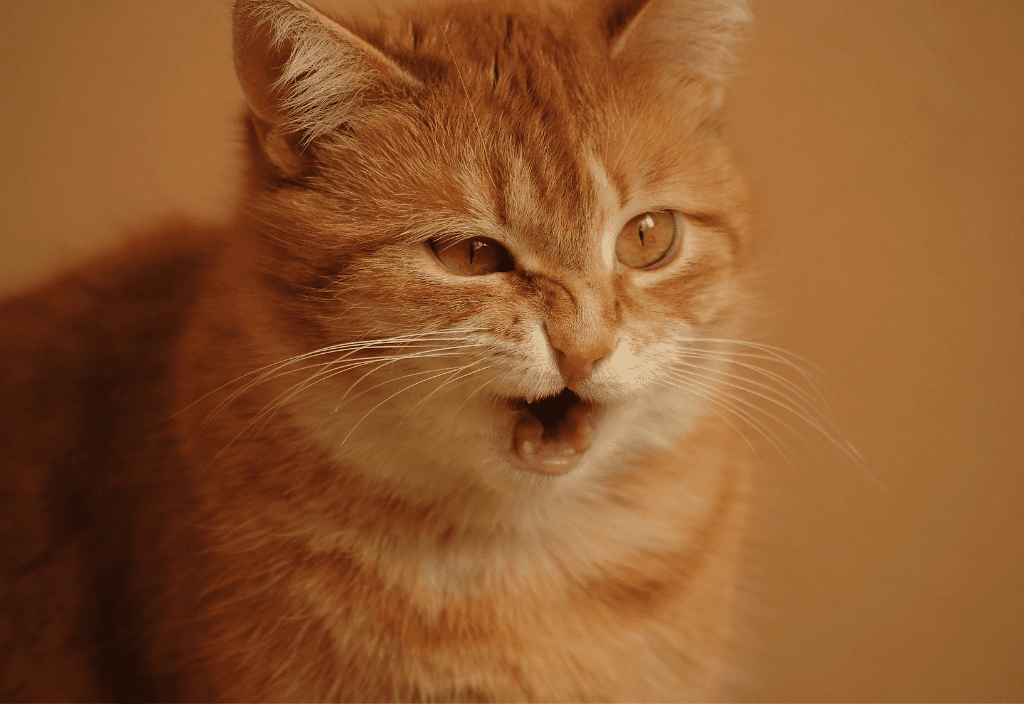
It’s heartbreaking to see our little one struggling with the symptoms of respiratory viruses. But as pet parents, we need to stay strong and offer our support. These are some easy ways to make sure your kitty is more comfortable as they fight off the flu:
The best way to support your cat’s recovery is inside out. Natural herbal supplements alongside a balanced diet can help offer the nutrients they need to stay strong and power through influenza.
NHV Felimm is a herbal blend that contains ingredients, like St. John’s wort, with strong antiviral properties. Some studies have revealed that pre-treatment with this plant extract may reduce viral titers (amount).
NHV Resp-Aid has anti-inflammatory and antibacterial properties that help ease chest and nose congestion, support healthy breathing and help fight infections. Therefore, it would benefit pets suffering from respiratory diseases like Kennel Cough.
NHV Natures Immuno has antiviral and antibacterial properties. So, pets with respiratory diseases caused by viruses or bacteria can benefit from this blend of five mushrooms.
If you have any questions about cat flu, kennel cough in dogs or any other respiratory viral infections in pets, we are here to help. As a matter of fact, we would love to offer support with any health concerns you may have as a pet parent. Press the button below and let someone on our team extend a helping hand or paw!
medicinal mushroom blend

Blend of medicinal mushrooms (turkey tails, cordyceps, reishi, shiitake, agaricus)
buy 2 and save $3
3 month supply for a small to medium size pet
What Is It?
A natural supplement that supports your cat’s immune system, boosts energy, and promotes overall well-being. It can be used alongside cancer treatments and helps support cardiovascular, endocrine, and kidney health.
How Does it Work?
Why Should I Trust It?
Natural mushroom blend formulated by veterinarians.

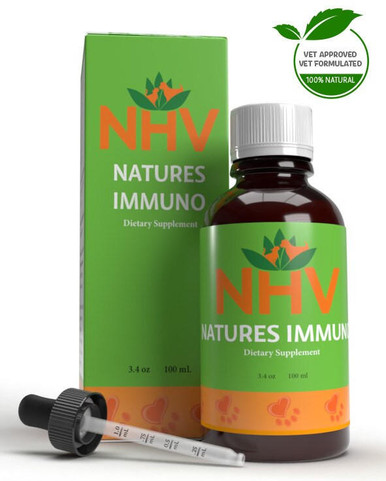
What Is It?
A natural supplement that supports your cat’s immune system, boosts energy, and promotes overall well-being. It can be used alongside cancer treatments and helps support cardiovascular, endocrine, and kidney health.
How Does it Work?
Why Should I Trust It?
Natural mushroom blend formulated by veterinarians.

Medicinal mushroom blends are used by holistic and conventional veterinarians to help cats suffering from a variety of health conditions. Their immune supporting effects help with feline cancer, chronic feline infections, liver disorders, compromised immune systems, endocrine disorders, and kidney, respiratory, and cardiovascular problems.
Medicinal mushrooms are currently being researched and studied for their vast array of health benefits. NHV uses these mushrooms as a primary ingredient in supplements that support the immune system of cats.
The healing power of medicinal mushrooms has been known throughout Asia for thousands of years. The pharmacological potential of medicinal mushrooms is being extensively studied around the globe. Research is finding that specific medicinal mushrooms, like Turkey Tail mushrooms, may have the potential to help treat cancer, balance the immune system, and aid with digestive problems.
“The mounting evidence from various research groups across the globe, regarding anti-tumor application of mushroom extracts unarguably make it a fast-track research area worth mass attention.” – (Patel and Goyal, 2012)
The five well-researched mushrooms contained in our vet-formulated cat immune support supplement blend include:
Because this blend is in liquid form, it helps increase the bioavailability of the mushrooms, so your cat absorbs the medicine at a faster rate.
Use NHV’s holistic immune cancer support for cats with treatment prescribed by your vet for comprehensive care. You can always ask the experts at NHV where our pet experts are here to help answer questions, offer guidance and give support along the way.
Read more about cat immune support using the miracles of medicinal mushrooms on our blog because, at NHV, we care about your cat’s health naturally.
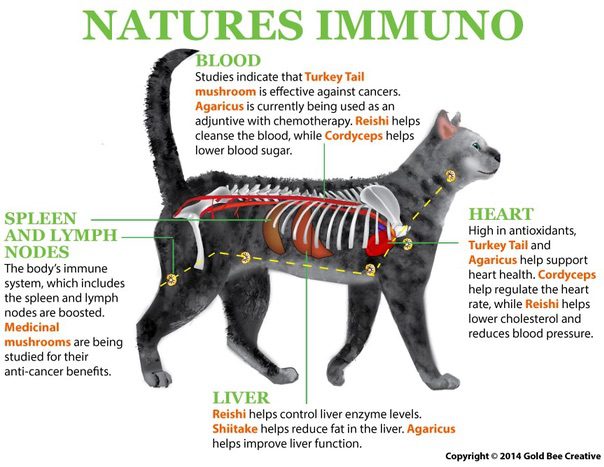
Turkey Tail mushroom has traditionally been used in Native American herbalism and in Chinese medicine to help improve immune function. It is a mushroom that has undergone a considerable resurgence in modern research for its health benefits. Studies have shown that it is beneficial for a wide variety of cancers, including mammary gland cancer and lymphoma. Researchers believe that Turkey Tail mushrooms contain properties that fight cancer while also helping to strengthen the immune system. It has antioxidant, anticarcinogenic, immune-modulating, anti-inflammatory, and cardioprotective properties.
Cordyceps mushroom is rich in phytonutrients and contains polysaccharides, which help with antioxidant properties. Research has indicated that cordyceps have anti-tumor, immune stimulating and hypoglycemic activity. They are beneficial for diabetes as they help lower blood sugar. Cordyceps are also beneficial for heart health, liver and kidney health.
Reishi mushroom has been used for thousands of years in traditional Chinese Medicine. Current research indicates that reishi mushrooms are helpful in supporting the immune and cardiovascular systems, as well as helping to increase oxygenation of the blood. Reishi is effective against sarcoma and tumor necrosis. Reishi is currently being used in Japan and China in conjunction with chemotherapy drugs.
Shiitake mushroom has been used for thousands of years in herbalism, and is also a popular cooking ingredient. Research indicates that Shiitake has strong antibiotic and antibacterial properties against a broad spectrum of pathogens. In addition to its potential cancer-fighting properties, it is useful in supporting heart health as it lowers cholesterol and helps lessen plaque in the arteries.
Agaricus mushroom is studied for their usefulness in preventing cancer cell production. Agaricus is considered an antimutagenic and an adaptogen, which helps combat stress and supports endocrine function. It is useful for pets with autoimmune conditions, digestive issues, and heart problems. Agaricus is being used in Japan as an adjunctive with chemotherapy treatments.
Select your pet's weight to determine the correct dose.
To be taken twice daily.
Determine your pet’s weight and then use the easy chart below to determine the correct dose. You can safely double the recommended dosage.
Pet's Weight Dosage
0 - 15 lb 0.5 mL
16 - 30 lb 1.0 mL
31 - 45 lb 1.5 mL
46 - 60 lb 2.0 mL
61 - 75 lb 2.5 mL
Over 75 lb 3.0 mL
How to Administer
Shake well before use. The easiest method is to use the dropper provided and place the drops into your pet’s food or favorite treat. You can also use the dropper and squirt directly into the pet’s mouth. Some pets can be finicky, if this occurs consider hiding the drops in foods most pet’s love such as fish, chicken, yogurt, or a favorite treat. If your pet only eats dry food then soak a few kibbles at feeding time.
For Best Results
Herbal dietary supplements are beneficial to the health and well-being of your pet and are safe for long-term use. Every pet responds to natural herbal supplements differently, therefore it is important to be consistent and administer the product daily. Supplements generally take two to four weeks to take effect, however this will vary from one animal to the next.
Product Storage
All NHV Natural Pet Products are pure herbal extracts and contain no artificial additives, preservatives or coloring. Shelf life after opening is 6 months and must be refrigerated after opening.
Medicinal mushroom blends are used by holistic and conventional veterinarians to help cats suffering from a variety of health conditions. Their immune supporting effects help with feline cancer, chronic feline infections, liver disorders, compromised immune systems, endocrine disorders, and kidney, respiratory, and cardiovascular problems.
Medicinal mushrooms are currently being researched and studied for their vast array of health benefits. NHV uses these mushrooms as a primary ingredient in supplements that support the immune system of cats.
The healing power of medicinal mushrooms has been known throughout Asia for thousands of years. The pharmacological potential of medicinal mushrooms is being extensively studied around the globe. Research is finding that specific medicinal mushrooms, like Turkey Tail mushrooms, may have the potential to help treat cancer, balance the immune system, and aid with digestive problems.
“The mounting evidence from various research groups across the globe, regarding anti-tumor application of mushroom extracts unarguably make it a fast-track research area worth mass attention.” – (Patel and Goyal, 2012)
The five well-researched mushrooms contained in our vet-formulated cat immune support supplement blend include:
Because this blend is in liquid form, it helps increase the bioavailability of the mushrooms, so your cat absorbs the medicine at a faster rate.
Use NHV’s holistic immune cancer support for cats with treatment prescribed by your vet for comprehensive care. You can always ask the experts at NHV where our pet experts are here to help answer questions, offer guidance and give support along the way.
Read more about cat immune support using the miracles of medicinal mushrooms on our blog because, at NHV, we care about your cat’s health naturally.

Turkey Tail mushroom has traditionally been used in Native American herbalism and in Chinese medicine to help improve immune function. It is a mushroom that has undergone a considerable resurgence in modern research for its health benefits. Studies have shown that it is beneficial for a wide variety of cancers, including mammary gland cancer and lymphoma. Researchers believe that Turkey Tail mushrooms contain properties that fight cancer while also helping to strengthen the immune system. It has antioxidant, anticarcinogenic, immune-modulating, anti-inflammatory, and cardioprotective properties.
Cordyceps mushroom is rich in phytonutrients and contains polysaccharides, which help with antioxidant properties. Research has indicated that cordyceps have anti-tumor, immune stimulating and hypoglycemic activity. They are beneficial for diabetes as they help lower blood sugar. Cordyceps are also beneficial for heart health, liver and kidney health.
Reishi mushroom has been used for thousands of years in traditional Chinese Medicine. Current research indicates that reishi mushrooms are helpful in supporting the immune and cardiovascular systems, as well as helping to increase oxygenation of the blood. Reishi is effective against sarcoma and tumor necrosis. Reishi is currently being used in Japan and China in conjunction with chemotherapy drugs.
Shiitake mushroom has been used for thousands of years in herbalism, and is also a popular cooking ingredient. Research indicates that Shiitake has strong antibiotic and antibacterial properties against a broad spectrum of pathogens. In addition to its potential cancer-fighting properties, it is useful in supporting heart health as it lowers cholesterol and helps lessen plaque in the arteries.
Agaricus mushroom is studied for their usefulness in preventing cancer cell production. Agaricus is considered an antimutagenic and an adaptogen, which helps combat stress and supports endocrine function. It is useful for pets with autoimmune conditions, digestive issues, and heart problems. Agaricus is being used in Japan as an adjunctive with chemotherapy treatments.
Select your pet's weight to determine the correct dose.
To be taken twice daily.
Determine your pet’s weight and then use the easy chart below to determine the correct dose. You can safely double the recommended dosage.
Pet's Weight Dosage
0 - 15 lb 0.5 mL
16 - 30 lb 1.0 mL
31 - 45 lb 1.5 mL
46 - 60 lb 2.0 mL
61 - 75 lb 2.5 mL
Over 75 lb 3.0 mL
How to Administer
Shake well before use. The easiest method is to use the dropper provided and place the drops into your pet’s food or favorite treat. You can also use the dropper and squirt directly into the pet’s mouth. Some pets can be finicky, if this occurs consider hiding the drops in foods most pet’s love such as fish, chicken, yogurt, or a favorite treat. If your pet only eats dry food then soak a few kibbles at feeding time.
For Best Results
Herbal dietary supplements are beneficial to the health and well-being of your pet and are safe for long-term use. Every pet responds to natural herbal supplements differently, therefore it is important to be consistent and administer the product daily. Supplements generally take two to four weeks to take effect, however this will vary from one animal to the next.
Product Storage
All NHV Natural Pet Products are pure herbal extracts and contain no artificial additives, preservatives or coloring. Shelf life after opening is 6 months and must be refrigerated after opening.
immune support
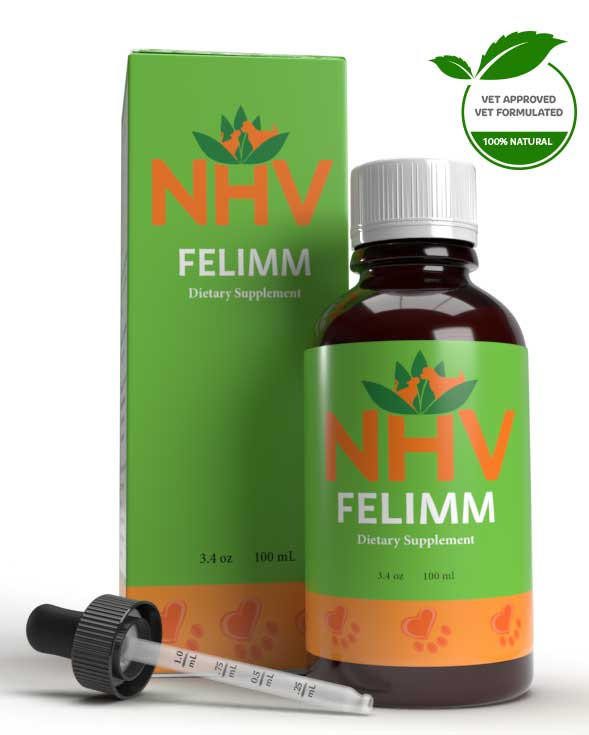
Natural herbal supplement to help your dog fight many viral, fungal, and bacterial related infections.
buy 2 and save $3
3 month supply for a small to medium size pet.
What is it?
Felimm helps your pup fight a variety of fungal and viral infections. This infection remedy for dogs helps combat Canine Herpesvirus, Canine Influenza, Lyme disease, Staphylococcal Bacterial, Ehrlichiosis, Aspergillosis, Blastomycosis Cryptococcus, Valley Fever, and yeast infections.
How Does it Work?
Why Should I Trust It?
Formulated with powerful, yet gentle herbs.

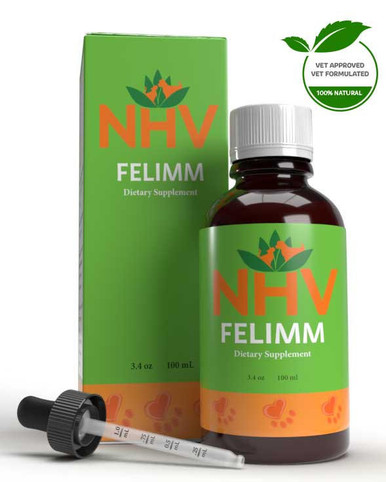
What is it?
Felimm helps your pup fight a variety of fungal and viral infections. This infection remedy for dogs helps combat Canine Herpesvirus, Canine Influenza, Lyme disease, Staphylococcal Bacterial, Ehrlichiosis, Aspergillosis, Blastomycosis Cryptococcus, Valley Fever, and yeast infections.
How Does it Work?
Why Should I Trust It?
Formulated with powerful, yet gentle herbs.

Dogs can get viral, fungal, and bacterial infections of many kinds. Canine herpesvirus, Canine influenza, Lyme disease, Staphylococcal bacterial, Ehrlichiosis, Aspergillosis, Blastomycosis Cryptococcus, Valley Fever, and yeast infections just to name a few. Felimm is a natural vet-formulated remedy that helps support your dog’s body and helps them fight back against all of these conditions. Add Felimm canine infection remedy to the regimen prescribed by your vet to give them the most comprehensive possible care.
Felimm is an infection remedy for dogs with many ingredients that have strong antiviral properties. Turmeric, Aloe Vera, St. John’s Wort, and Myrrh have antiseptic, antibacterial, antiviral, and anti-inflammatory qualities that help make Felimm a powerful remedy to support your dog against a variety of conditions.
Viruses, as well as fungal and bacterial infections, can harm your dog’s immune system and affect the function of other organs. Some of these viruses, such as canine herpesvirus (CHV) or canine influenza virus, affect the respiratory and reproductive system. Felimm is also an excellent support supplement for pets fighting lymphoma.
To help your pet heal, it is important to support the affected organs and balance their immune system. NHV Felimm contains a variety of potent herbs that help support and defend the body against viral, fungal, and bacterial infections while boosting the immune system and detoxifying the lymph nodes.
NHV Felimm can help with Lyme disease in dogs and cats - a bacterial infection transmitted by ticks. This dog infection remedy can also help with Cryptococcus, a fungal infection caused by environmental yeast.
NHV’s holistic pet products contain human-grade herbal ingredients. All of our supplements are vet-approved and specially formulated by a veterinarian and master herbalist with over 20 years of experience.
Call the NHV pet expert hotline at 1-877-937-4327 to learn about our dog infection treatment aids.
St. John’s Wort – A herb known to have strong antiviral, immunostimulant, anti-inflammatory, antiretroviral and antibacterial properties. St. John’s Wort has a history of use to help the body fight the herpes virus, as well as viral hepatitis and HIV. It helps with inhibiting the reproduction of the viruses and has been shown to be beneficial for canine distemper.
Turmeric – A very powerful antioxidant that helps combat the damaging effects of free radicals. It strengthens liver function and contains strong antifungal properties.
Aloe Vera – Helps control fungal infections, and helps improve white blood cell counts which helps destroy infectious organisms. An herb that is known for its immunostimulating, antibacterial, antitumor, and anti-inflammatory properties.
Alfalfa – An extremely nutritious herb that is high in minerals, amino acids, a good source of chlorophyll, and high in antioxidants.
Burdock – Is an herb and a food that is very nutritive as it contains high levels of minerals such as iron and calcium. Strong antiviral properties support the liver and gallbladder, and help clean and improve the quality of blood. It helps remove toxins that accumulate during illness and helps scavenge free radicals from a dog’s body.
Cat’s Claw – Has traditionally been used in herbal medicine to treat the herpes virus and other related viral infections due to properties that help balance the immune system while fighting off infections and inflammation.
Osha – Used for centuries to help fight viral infections that affect the respiratory system. It helps to relieve inflammation of the bronchial tube, relax the muscles, and stops bacteria and viruses from spreading. A natural immune builder that helps dogs fight infections and helps improve immune function.
Dandelion – A highly nutritious food that stimulates liver secretion, protects the kidneys, improves digestion, and stimulates appetite. It helps provide a pet’s body with the vitamins and minerals needed when fighting an infection. It is known to help reduce inflammation.
Gotu Kola – An antioxidant-rich herb known to strengthen the immune system and protect cells from damage caused by free radicals. It helps calm the nervous system to reduce the added stress canines exhibit when fighting infections. It is also used to help with respiratory issues.
Usnea – An immune system stimulant with antibacterial and antifungal properties that helps protect a dog’s suppressed immune system from respiratory and sinus infections, bronchial issues, canine influenza, and herpes virus. It helps boost and restore proper immune function.
Goldenseal – An herb known for improving immune function. It helps eliminate toxins from the blood. It has strong fungal fighting properties and is used when dealing with Candida and thrush in dogs.
Myrrh – a medicinal herb that dates back to 1550 BC. Considered to be a natural antibiotic, antiviral, and astringent herb. It strengthens and improves the immune system and helps fight infections.
Select your pet's weight to determine the correct dose.
To be taken twice daily. Determine your pet’s weight and then use the easy chart below to determine the correct dose. This is the minimum dosage.
Pet's Weight Dosage
0 - 15 lb = 0.5 ml
16 - 30 lb = 1.0 ml
31 - 45 lb = 1.5 ml
46 - 60 lb = 2.0 ml
61 - 75 lb = 2.5 ml
Over 75 lb = 3.0 ml
How to Administer
Shake well before use. The easiest method is to use the dropper provided and place the drops into your pet’s food or favorite treat. You can also use the dropper and squirt directly into the pet’s mouth. Some pets can be finicky, if this occurs consider hiding the drops in foods most pet’s love such as fish, chicken or yogurt or a favorite treat. If your pet only eats dry food then soak a few kibbles at feeding time.
For Best Results
Herbal dietary supplements are beneficial to the health and well-being of your pet and are safe for long-term use. Every pet responds to natural herbal supplements differently, therefore it is important to be consistent and administer the product daily. Supplements generally take two to four weeks to take effect, however this will vary from one animal to the next.
Product Storage
All NHV Natural Pet Products are pure herbal extracts and contain no artificial additives, preservatives or coloring. Shelf life after opening is 6 months and must be refrigerated after opening.
Cautions and Contraindications
Do not use Felimm in pregnant or nursing animals. Speak to your vet before using our products. A second visit is recommended if your pet’s condition does not improve, or deteriorates after continued use of the supplements.
All information provided by NHV Natural Pet Products is for educational purposes only.
Dogs can get viral, fungal, and bacterial infections of many kinds. Canine herpesvirus, Canine influenza, Lyme disease, Staphylococcal bacterial, Ehrlichiosis, Aspergillosis, Blastomycosis Cryptococcus, Valley Fever, and yeast infections just to name a few. Felimm is a natural vet-formulated remedy that helps support your dog’s body and helps them fight back against all of these conditions. Add Felimm canine infection remedy to the regimen prescribed by your vet to give them the most comprehensive possible care.
Felimm is an infection remedy for dogs with many ingredients that have strong antiviral properties. Turmeric, Aloe Vera, St. John’s Wort, and Myrrh have antiseptic, antibacterial, antiviral, and anti-inflammatory qualities that help make Felimm a powerful remedy to support your dog against a variety of conditions.
Viruses, as well as fungal and bacterial infections, can harm your dog’s immune system and affect the function of other organs. Some of these viruses, such as canine herpesvirus (CHV) or canine influenza virus, affect the respiratory and reproductive system. Felimm is also an excellent support supplement for pets fighting lymphoma.
To help your pet heal, it is important to support the affected organs and balance their immune system. NHV Felimm contains a variety of potent herbs that help support and defend the body against viral, fungal, and bacterial infections while boosting the immune system and detoxifying the lymph nodes.
NHV Felimm can help with Lyme disease in dogs and cats - a bacterial infection transmitted by ticks. This dog infection remedy can also help with Cryptococcus, a fungal infection caused by environmental yeast.
NHV’s holistic pet products contain human-grade herbal ingredients. All of our supplements are vet-approved and specially formulated by a veterinarian and master herbalist with over 20 years of experience.
Call the NHV pet expert hotline at 1-877-937-4327 to learn about our dog infection treatment aids.
St. John’s Wort – A herb known to have strong antiviral, immunostimulant, anti-inflammatory, antiretroviral and antibacterial properties. St. John’s Wort has a history of use to help the body fight the herpes virus, as well as viral hepatitis and HIV. It helps with inhibiting the reproduction of the viruses and has been shown to be beneficial for canine distemper.
Turmeric – A very powerful antioxidant that helps combat the damaging effects of free radicals. It strengthens liver function and contains strong antifungal properties.
Aloe Vera – Helps control fungal infections, and helps improve white blood cell counts which helps destroy infectious organisms. An herb that is known for its immunostimulating, antibacterial, antitumor, and anti-inflammatory properties.
Alfalfa – An extremely nutritious herb that is high in minerals, amino acids, a good source of chlorophyll, and high in antioxidants.
Burdock – Is an herb and a food that is very nutritive as it contains high levels of minerals such as iron and calcium. Strong antiviral properties support the liver and gallbladder, and help clean and improve the quality of blood. It helps remove toxins that accumulate during illness and helps scavenge free radicals from a dog’s body.
Cat’s Claw – Has traditionally been used in herbal medicine to treat the herpes virus and other related viral infections due to properties that help balance the immune system while fighting off infections and inflammation.
Osha – Used for centuries to help fight viral infections that affect the respiratory system. It helps to relieve inflammation of the bronchial tube, relax the muscles, and stops bacteria and viruses from spreading. A natural immune builder that helps dogs fight infections and helps improve immune function.
Dandelion – A highly nutritious food that stimulates liver secretion, protects the kidneys, improves digestion, and stimulates appetite. It helps provide a pet’s body with the vitamins and minerals needed when fighting an infection. It is known to help reduce inflammation.
Gotu Kola – An antioxidant-rich herb known to strengthen the immune system and protect cells from damage caused by free radicals. It helps calm the nervous system to reduce the added stress canines exhibit when fighting infections. It is also used to help with respiratory issues.
Usnea – An immune system stimulant with antibacterial and antifungal properties that helps protect a dog’s suppressed immune system from respiratory and sinus infections, bronchial issues, canine influenza, and herpes virus. It helps boost and restore proper immune function.
Goldenseal – An herb known for improving immune function. It helps eliminate toxins from the blood. It has strong fungal fighting properties and is used when dealing with Candida and thrush in dogs.
Myrrh – a medicinal herb that dates back to 1550 BC. Considered to be a natural antibiotic, antiviral, and astringent herb. It strengthens and improves the immune system and helps fight infections.
Select your pet's weight to determine the correct dose.
To be taken twice daily. Determine your pet’s weight and then use the easy chart below to determine the correct dose. This is the minimum dosage.
Pet's Weight Dosage
0 - 15 lb = 0.5 ml
16 - 30 lb = 1.0 ml
31 - 45 lb = 1.5 ml
46 - 60 lb = 2.0 ml
61 - 75 lb = 2.5 ml
Over 75 lb = 3.0 ml
How to Administer
Shake well before use. The easiest method is to use the dropper provided and place the drops into your pet’s food or favorite treat. You can also use the dropper and squirt directly into the pet’s mouth. Some pets can be finicky, if this occurs consider hiding the drops in foods most pet’s love such as fish, chicken or yogurt or a favorite treat. If your pet only eats dry food then soak a few kibbles at feeding time.
For Best Results
Herbal dietary supplements are beneficial to the health and well-being of your pet and are safe for long-term use. Every pet responds to natural herbal supplements differently, therefore it is important to be consistent and administer the product daily. Supplements generally take two to four weeks to take effect, however this will vary from one animal to the next.
Product Storage
All NHV Natural Pet Products are pure herbal extracts and contain no artificial additives, preservatives or coloring. Shelf life after opening is 6 months and must be refrigerated after opening.
Cautions and Contraindications
Do not use Felimm in pregnant or nursing animals. Speak to your vet before using our products. A second visit is recommended if your pet’s condition does not improve, or deteriorates after continued use of the supplements.
All information provided by NHV Natural Pet Products is for educational purposes only.
respiratory support
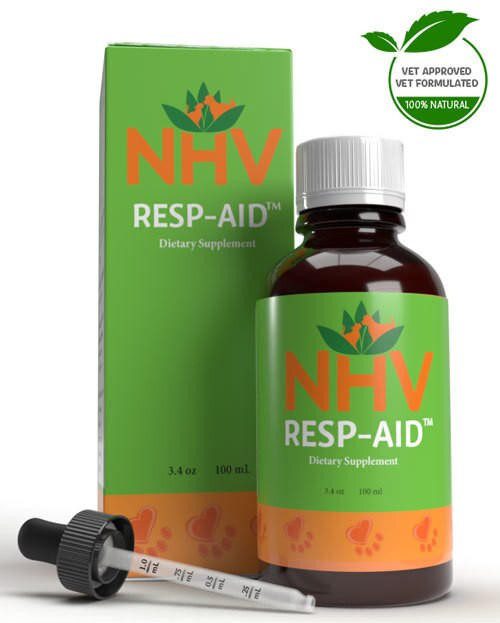
For Coughs, Respiratory Disorders, and Bronchial Infections in Cats
buy 2 and save $3
3 month supply for a small to medium size
What is it?
Powerful natural support to help your cat breath easy.
How does it work?
Why trust it?
A study of NHV Resp-Aid found it to be helpful for pets with asthma.
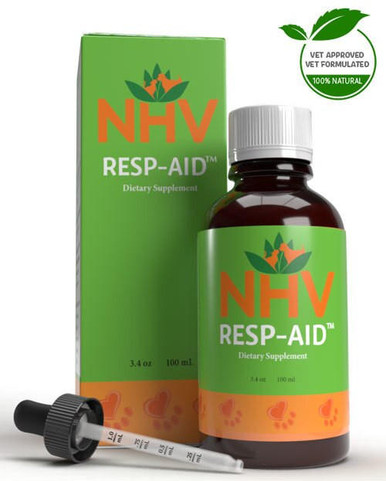
What is it?
Powerful natural support to help your cat breath easy.
How does it work?
Why trust it?
A study of NHV Resp-Aid found it to be helpful for pets with asthma.
Many cats suffer from breathing difficulties which can lead to respiratory infections. Symptoms of respiratory infections in cats are similar to those in humans such as watery eyes, runny nose, sneezing, coughing, and difficulty breathing. Resp-Aid™ is a holistic all-natural remedy for respiratory infection in cats to help provide them relief.
NHV Resp-Aid is currently under clinical studies conducted jointly with the University of Saskatchewan and the University of Calgary. The study found that the lungs from asthmatic animals treated with Resp-Aid showed considerably less inflammation and histopathology compared with asthmatic animals lungs that did not receive Resp-Aid. You can read the latest on this innovative study here.
Some cat breeds are more susceptible to breathing difficulties such as Siamese. Find out if your cat breed is prone to breathing difficulties at NHV online breeds and conditions. Respiratory infections in cats can be caused by:
Read about a rescue kitty named Hunter and how he found relief with NHV’s remedy for respiratory infection in cats.
If you have questions about natural remedies for respiratory infections in cats or any of our plant-based products you can ask an expert at NHV. Our pet experts can offer guidance and support because NHV wants all pet parents and their fur children to breathe easy naturally.
NHV’s Resp-Aid contains a proprietary blend of nine highly effective herbs that help support healthy breathing making this a formidable remedy for respiratory infections in cats.
Select your pet's weight to determine the correct dose.
To be taken twice daily. Determine your pet’s weight and then use the easy chart below to determine the correct dose. This is the minimum dosage.
Pet's Weight Dosage
0 - 15 lb = 0.5 ml
16 - 30 lb = 1.0 ml
31 - 45 lb = 1.5 ml
46 - 60 lb = 2.0 ml
61 - 75 lb = 2.5 ml
Over 75 lb = 3.0 ml
How to Administer
Shake well before use. The easiest method is to use the dropper provide and places the drops into your pet’s food or favorite treat. You can also use the dropper and squirt directly into the pet’s mouth.
Some pets can be finicky, if this occurs consider hiding the drops in foods most pet’s love such as fish, chicken or yogurt or a favourite treat. If your pet only eats dry food then soak a few kibbles at feeding time.
For Best Results
Herbal dietary supplements are beneficial to the health and wellbeing of your pet and are safe for long-term use. Every pet responds to natural herbal supplements differently, therefore it is important to be consistent and administer the product daily. Supplements generally take two to four weeks to take effect, however this will vary from one animal to the next.
Product Storage
All NHV Natural Pet Products are pure herbal extracts and contain no artificial additives, preservatives or coloring. Shelf life after opening is 6 months and must be refrigerated after opening.
Cautions and Contraindications
Do not use in pregnant or nursing animals. Speak to your vet before using our products. A second visit is recommended if your pet’s condition does not improve, or deteriorates after continued use of the supplements.
All information provided by NHV Natural Pet Products is for educational purposes only.
Many cats suffer from breathing difficulties which can lead to respiratory infections. Symptoms of respiratory infections in cats are similar to those in humans such as watery eyes, runny nose, sneezing, coughing, and difficulty breathing. Resp-Aid™ is a holistic all-natural remedy for respiratory infection in cats to help provide them relief.
NHV Resp-Aid is currently under clinical studies conducted jointly with the University of Saskatchewan and the University of Calgary. The study found that the lungs from asthmatic animals treated with Resp-Aid showed considerably less inflammation and histopathology compared with asthmatic animals lungs that did not receive Resp-Aid. You can read the latest on this innovative study here.
Some cat breeds are more susceptible to breathing difficulties such as Siamese. Find out if your cat breed is prone to breathing difficulties at NHV online breeds and conditions. Respiratory infections in cats can be caused by:
Read about a rescue kitty named Hunter and how he found relief with NHV’s remedy for respiratory infection in cats.
If you have questions about natural remedies for respiratory infections in cats or any of our plant-based products you can ask an expert at NHV. Our pet experts can offer guidance and support because NHV wants all pet parents and their fur children to breathe easy naturally.
NHV’s Resp-Aid contains a proprietary blend of nine highly effective herbs that help support healthy breathing making this a formidable remedy for respiratory infections in cats.
Select your pet's weight to determine the correct dose.
To be taken twice daily. Determine your pet’s weight and then use the easy chart below to determine the correct dose. This is the minimum dosage.
Pet's Weight Dosage
0 - 15 lb = 0.5 ml
16 - 30 lb = 1.0 ml
31 - 45 lb = 1.5 ml
46 - 60 lb = 2.0 ml
61 - 75 lb = 2.5 ml
Over 75 lb = 3.0 ml
How to Administer
Shake well before use. The easiest method is to use the dropper provide and places the drops into your pet’s food or favorite treat. You can also use the dropper and squirt directly into the pet’s mouth.
Some pets can be finicky, if this occurs consider hiding the drops in foods most pet’s love such as fish, chicken or yogurt or a favourite treat. If your pet only eats dry food then soak a few kibbles at feeding time.
For Best Results
Herbal dietary supplements are beneficial to the health and wellbeing of your pet and are safe for long-term use. Every pet responds to natural herbal supplements differently, therefore it is important to be consistent and administer the product daily. Supplements generally take two to four weeks to take effect, however this will vary from one animal to the next.
Product Storage
All NHV Natural Pet Products are pure herbal extracts and contain no artificial additives, preservatives or coloring. Shelf life after opening is 6 months and must be refrigerated after opening.
Cautions and Contraindications
Do not use in pregnant or nursing animals. Speak to your vet before using our products. A second visit is recommended if your pet’s condition does not improve, or deteriorates after continued use of the supplements.
All information provided by NHV Natural Pet Products is for educational purposes only.
Published: October 4, 2022